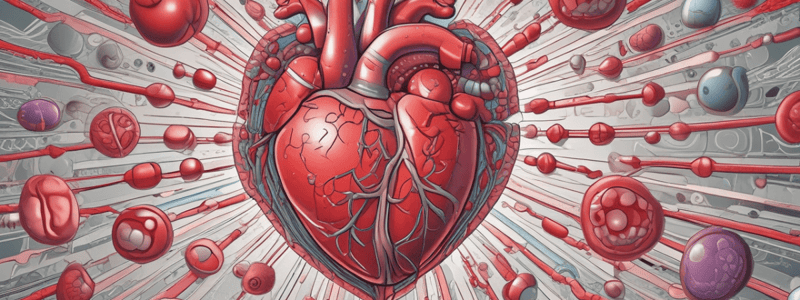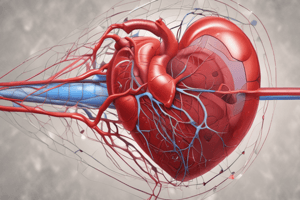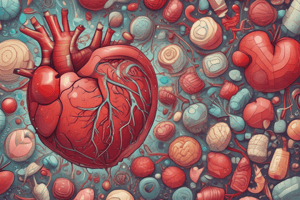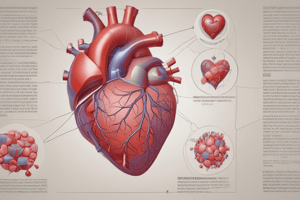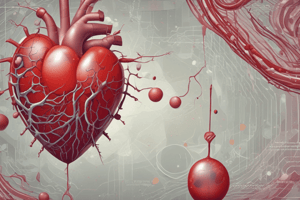Podcast
Questions and Answers
Adenosine is used to treat which heart problem?
Adenosine is used to treat which heart problem?
- Cardiac arrest
- Hypertension
- Heart failure
- Arrhythmia (correct)
What is the mechanism of action for anticoagulants?
What is the mechanism of action for anticoagulants?
- Preventing platelet aggregation
- Inhibiting thrombin formation (correct)
- Increasing blood pressure
- Breaking up existing clots
What is the prototype drug for thrombolytics?
What is the prototype drug for thrombolytics?
- tPA (correct)
- Warfarin
- Heparin
- Aspirin
What is the reversal agent for heparin toxicity?
What is the reversal agent for heparin toxicity?
What is Heparin Induced Thrombocytopenia (HIT)?
What is Heparin Induced Thrombocytopenia (HIT)?
What enzyme does aspirin inhibit?
What enzyme does aspirin inhibit?
What should the nurse check before administering aspirin?
What should the nurse check before administering aspirin?
What is the normal therapeutic range for INR?
What is the normal therapeutic range for INR?
What is the effect of Class II antiarrhythmics on the heart?
What is the effect of Class II antiarrhythmics on the heart?
What type of beta blocker is preferred for patients with respiratory issues?
What type of beta blocker is preferred for patients with respiratory issues?
What is the effect of Amiodarone on potassium channels?
What is the effect of Amiodarone on potassium channels?
What is the effect of Calcium Channel Blockers on the heart rate?
What is the effect of Calcium Channel Blockers on the heart rate?
What is the purpose of Anticoagulant therapy?
What is the purpose of Anticoagulant therapy?
What is the effect of Aspirin on platelets?
What is the effect of Aspirin on platelets?
What is the antidote for heparin overdose?
What is the antidote for heparin overdose?
What is the effect of Warfarin on blood clotting factors?
What is the effect of Warfarin on blood clotting factors?
What is the target of Direct Thrombin inhibitors?
What is the target of Direct Thrombin inhibitors?
What is the effect of tPA (alteplase) on blood clots?
What is the effect of tPA (alteplase) on blood clots?
Study Notes
Adenosine
- Used to treat Supraventricular Tachycardia (SVT) with heart rates > 150 bpm
- Side effects: chest pain or palpitations, bradycardia, flushing, dizziness, hypotension, feeling of impending doom
- Returns the heart rate back to normal sinus rhythm (60-100 bpm)
Anticoagulants
- Mechanism of action: disrupt the coagulation cascade, suppressing the production of fibrin
- Do not break up existing clots, only slow the development of future clots
- Prototype drugs: Heparin, Enoxaparin, Warfarin
- Direct Oral Anticoagulants (DOACs): Dabigatran, Rivaroxaban, Apixaban
Antiplatelet Drugs
- Mechanism of action: inhibit platelet aggregation, preventing platelets from clumping together to form clots
- Prototype drugs: Aspirin, Clopidogrel, Ticagrelor
- Aspirin: inhibits cyclooxygenase (COX), preventing the synthesis of thromboxane, which prevents aggregation and clot formation
- Low dose aspirin: 81mg, full dose: 325mg
Thrombolytics
- Mechanism of action: promote the lysis (breaking) of fibrin and the dissolution of thrombi
- Prototype drug: tPA (alteplase)
- Administration: IV, only for ischemic strokes (cerebrovascular accidents)
Heparin
- Mechanism of action: activates antithrombin, which inactivates clotting factors Xa and thrombin, preventing the conversion of fibrinogen to fibrin
- Routes of administration: SubQ, IV
- Not taken orally due to poor absorption
- Should be avoided via IM route due to risk of hematoma formation
- Uses: prophylactic (prevents clots from forming) and therapeutic (prevents current clots from getting bigger)
- Side effects: bleeding, bloody stool, vomiting that looks like coffee grounds, petechiae
- Safe during pregnancy
- Reversal agent: Protamine Sulfate
- Heparin induced Thrombocytopenia (HIT): immune response against heparin, first sign is a 50% drop in platelet count
Warfarin
- Mechanism of action: inhibits the synthesis of vitamin K dependent clotting factors, especially factor X and thrombin
- Monitoring: PT and INR
- Normal therapeutic range for INR: 2-3 (2.5-3.5 for mechanical heart valves)
- Not safe during pregnancy
- Vitamin K intake should be consistent to maintain a stable INR
Studying That Suits You
Use AI to generate personalized quizzes and flashcards to suit your learning preferences.
Description
This quiz covers various cardiovascular medications, including adenosine, anticoagulants, antiplatelet drugs, and thrombolytics, discussing their mechanisms of action, side effects, and prototype drugs.
